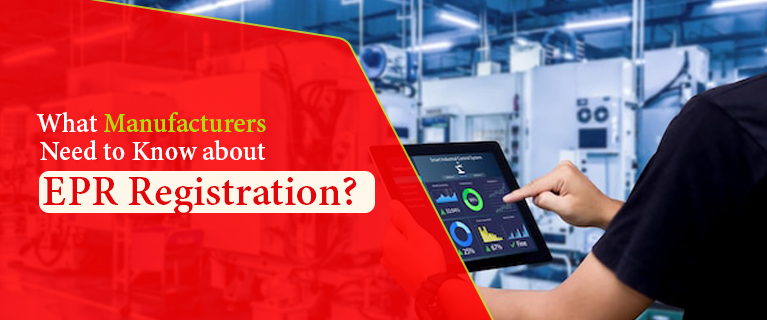How To Apply Online For EPR Registration?
Extended Producer Responsibility (EPR) is a policy framework that places the onus on manufacturers, importers, and producers of products to take responsibility for the entire lifecycle of their products, including post-consumer waste management. EPR Registration aims to promote environmental sustainability by ensuring that those who produce goods are actively involved in managing their environmental impact. EPR Registration is the process by which businesses comply with EPR regulations and fulfil their obligations towards managing waste generated from their products.
What is EPR Registration: Extended Producer Responsibility (EPR) is a progressive environmental concept that emphasizes the accountability of manufacturers, importers, and producers for the waste generated by their products. In a world grappling with escalating environmental concerns, EPR serves as a crucial mechanism to reduce the environmental footprint of goods and materials.
Framework for Sustainable Waste Management: EPR Registration is the pivotal link between responsible businesses and sustainable waste management practices. By registering under EPR, businesses commit to actively participating in the collection, recycling, and safe disposal of post-consumer waste stemming from their products.
Promoting Circular Economy: EPR Registration is a cornerstone of the circular economy, a model that envisions minimizing waste and maximizing resource utilization. Through EPR, products are designed, manufactured, and managed with the end goal of reusing, recycling, or safely disposing of materials.
Collaborative Efforts for a Cleaner Tomorrow:EPR Registration encourages collaboration between industries, governments, and consumers. It fosters a holistic approach to waste management, ensuring that all stakeholders play a role in safeguarding the environment.
How to Apply Online for EPR Registration:
Step 1: Visit the EPR Portal: Access the official EPR portal provided by the regulatory authorities. This portal serves as the digital platform for initiating the EPR Registration process.
Step 2: Create an Account: Register on the portal by creating an account using valid email credentials and contact information. A verification process may be required.
Step 3: Log In and Access EPR Registration Section: After successful registration, log in to your account and navigate to the EPR Registration section.
Step 4: Fill in Business Details: Provide accurate and comprehensive information about your business, including its name, address, contact details, and relevant registration numbers (such as GSTIN).
Step 5: Product Details: Specify the details of the products that your business manufactures, imports, or produces. This includes information about the type, quantity, and nature of products.
Step 6: Upload Required Documents: Prepare and upload necessary documents, such as business registration certificates, product details, environmental compliance reports, and any other relevant documents specified by the regulatory authorities.
Step 7: Payment of Fees: Pay the required registration fees through the online payment gateway provided on the EPR portal. Keep the receipt of the payment.
Step 8: Review and Submit: Thoroughly review the information and documents you have provided. Ensure all the necessary corrections are made before submitting the application.
Step 9: Acknowledgment and Tracking: Upon submission, you will receive an acknowledgment or reference number. Use this number to track the status of your EPR Registration application.
Step 10: Await Approval: The regulatory authorities will review your application and documents. If everything is in order, you will receive approval for your EPR Registration. In case of any discrepancies, you may be required to provide additional information or rectify errors.
Conclusion:
EPR Registration is not merely a bureaucratic process; it represents a commitment to environmental stewardship and sustainable business practices. By assuming responsibility for the lifecycle of their products, businesses contribute to a greener, cleaner, and more sustainable future, aligning their operations with the pressing need for global environmental protection.



Comments
Post a Comment